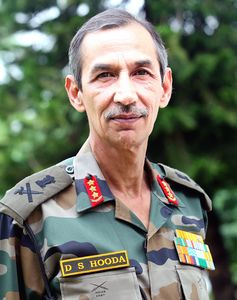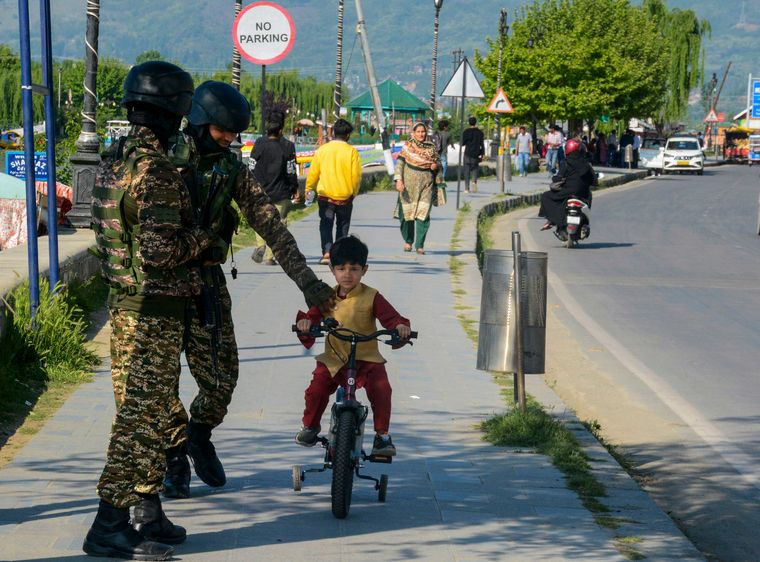ON APRIL 22, the tranquillity of the scenic meadows of Baisaran valley near Pahalgam was shattered by the sounds of gunfire, as terrorists ruthlessly gunned down innocent tourists. In the massacre, 26 lives were lost as men were singled out and shot in front of their wives and children.
There is enormous anger in India, mainly directed at Pakistan and its army, which is considered the principal architect of terror attacks in Jammu and Kashmir. There are the usual denials from Pakistan, with some politicians even claiming that it was a “false flag” operation orchestrated by India to justify retaliation against Pakistan. Such outrageous claims would be dismissed as laughable if the situation were not so serious.
I do not wish to decode the reasons why the Pakistan army would have triggered this deliberate provocation that could lead to an armed confrontation. There are no logical explanations beyond the ideological, deep-rooted hostility to India that many Pakistan army generals develop throughout their careers.
The problem is compounded by the nature of the civil-military relations in Pakistan, which has marginalised the role of the political leadership and concentrated all power in the hands of the military. This results in poor strategic assessments, as witnessed in the Kargil War. In the absence of political checks, the Pakistan army continues to make strategic decisions without fully comprehending the political and diplomatic fallout.
India reacted immediately, cancelling the visas of Pakistani citizens and shutting down the Attari-Wagah border. In a significant move that has long-term implications for Pakistan’s water security, the Indus Water Treaty has been held in abeyance. In response, Pakistan has threatened to suspend all bilateral treaties with India, including the Shimla Agreement. In addition, Pakistan has closed its airspace for Indian commercial flights.
After this tit-for-tat, all eyes are now on whether India will respond militarily. References are made to the 2016 ‘surgical strikes’ and the 2019 Balakot airstrike when India carried out cross-border operations in response to major terrorist attacks at Uri and Pulwama. In considering India’s options, it would be helpful to draw some important takeaways from the 2016 and 2019 responses.
Four key takeaways can be made. First, Prime Minister Narendra Modi’s government has a greater appetite for risk-taking than some of the previous governments when it comes to using military force to respond to terror attacks. The use of the Air Force in 2019 to hit targets that were on Pakistan territory (outside Pakistan-occupied Jammu and Kashmir) could definitely be considered escalatory, but the government went ahead.
Second, there is a clear communication of intent that terror activities sponsored by Pakistan would meet a forceful response. Limited cross-border operations had been conducted by the Army in the past but were not publicised. By announcing that India had carried out operations across the Line of Control in 2016 and 2019, the government was laying down red lines, which, if breached, would invite retribution.
Third, India had demonstrated that it would not be intimidated by Pakistan’s nuclear threats. In any crisis, Pakistan immediately waves the nuclear card. Nuclear blackmail by Pakistan would no longer work in restraining India from conducting limited strikes.
Fourth, the military response by India in 2016 and 2019 had overwhelming public support. Some of this support also translated into electoral success. In some ways, this has set a standard for actions by the government in responding to major terror strikes.
These four takeaways suggest that the military option would be under serious consideration by the government. Whatever course of action is chosen, it must be carefully planned and precisely calibrated. Potential retaliation from Pakistan must be anticipated, with thorough deliberation on escalation management and control across a range of possible scenarios.
The government should also insulate itself from the clamour on social media. The growing influence of these platforms has led many politicians to seek public approval online with increasing fervour. Strategic decisions, especially those involving national security, demand patience, clarity, and resolve, not emotional reactions to online voices. Real leadership is measured by long-term outcomes, not by the number of likes and shares.
Even as the government deals with the immediate crisis, it must not lose sight of the larger strategic imperative: developing a long-term framework to deal with an increasingly antagonistic neighbour. Pakistan’s persistent use of terrorism as an instrument of state policy demands a comprehensive and sustained deterrence strategy.
Some strategic thinkers argue that Pakistan’s entrenched ideology and deep-rooted hostility limit the effectiveness of conventional deterrence methods. While this argument has some merit, this cannot be the excuse for strategic inertia. Unless we look beyond reactive measures, we risk being trapped in a perpetual cycle of crisis management―lurching from one provocation to the next without altering the fundamentals of the equation.
The Pahalgam massacre has brought India’s political parties together in a rare and much-needed display of unity. This moment presents a valuable opportunity to forge a coherent, long-term approach to the challenge posed by Pakistan. With its economic and diplomatic heft and a capable military, there are enough instruments with India to apply sustained pressure on Pakistan across multiple fronts. What is needed now is a farsighted strategy that transcends political cycles and remains resilient across successive governments.
Unfortunately, some political fractures have started emerging because of ill-considered remarks made by leaders. Rather than exaggerating or sensationalising these differences, it is essential to play them down and focus on the national interest. In this time of a national crisis, the country and its leaders must demonstrate maturity and a common purpose, both for the people of India and for the message it sends beyond our borders.
This is also the time to turn our gaze inwards towards Jammu and Kashmir. Bringing peace to this area will puncture Pakistan’s narrative of the two-nation theory and Kashmir being its jugular vein. However, normalcy will only come if the people of the Union territory reject terrorism and fully embrace India.
And here is the only possible bright spark in the Pahalgam tragedy. People from across the Union territory turned out in large numbers, denouncing terrorist violence. There were shutdowns in towns such as Srinagar, Pulwama, Shopian, Anantnag, Baramulla and Pahalgam. Mosques in Kashmir observed a two-minute silence in memory of those killed in Pahalgam. These were unprecedented scenes displaying the local aspirations to move beyond the violence that has plagued this region.
In a special session of the Jammu and Kashmir Assembly, Chief Minister Omar Abdullah said, “We cannot control a terrorist with a gun, but we can end militancy if people are with us. I think that time has come. Given the public outrage… this is the beginning of its end if we take the proper steps.”
It is absolutely crucial that the Centre takes appropriate steps to create conditions where the anti-terrorist sentiment in the state is reinforced. This will require a shift in our strategy that is currently over-focused on security parameters like violence levels and terrorists killed as an indicator of normalcy. People are at the heart of any long-term resolution of internal conflicts, and their support is vital in ensuring enduring peace.
We are seeing an intensification of counter-terror operations in Jammu and Kashmir, and this is an obvious reaction to the outrage of the Pahalgam massacre. However, a ham-handed approach like the blowing up of houses of relatives of terrorists might appear optically satisfying, but could increase alienation. This is just what we should be avoiding.
Terrorism is a war of narratives and perceptions. The Pahalgam massacre was a calculated strike, not just against innocent civilians but against the image of a Kashmir enjoying the fruits of a period of relative calm. It was meant to reignite anxieties and provoke communal fissures. In such a conflict, the response cannot be limited to security operations alone. The battle must also be won in the hearts and minds of people by reaffirming trust, amplifying the voices of peace, and dismantling the falsehoods that terrorist groups and their backers desperately seek to propagate.
Also Read
- 'India is preparing to meet multi-domain threats': Rajnath Singh to THE WEEK
- Pahalgam attack: Escalation is imminent, and multiple arms of govt are on the task
- India's military preparedness and challenges: What ex-chiefs of Army, Navy, Air Force say
- How China can assist Pakistan in aftermath of Pahalgam terror attack
- Why Pakistan army chief Asim Munir is raising tensions with India
- 'Countries fighting terrorism, radicalism quick to identify with India over Pahalgam'
The Pahalgam massacre has once again laid bare the deep-rooted hostility of Pakistan’s military establishment, which continues to wield terrorism as a tool of statecraft without regard for the cost to its own country. India must respond with resolve while also crafting a strategy that systematically raises the costs for Pakistan’s actions over the long term.
We must also review our strategy in Jammu and Kashmir, where the unprecedented public outcry against terrorism offers a rare and precious opportunity. Winning this battle requires more than punishing perpetrators; it demands earning the enduring trust of the people. If India can combine firmness against external threats with compassion and foresight in Kashmir, it will not only defeat the immediate challenge but also lay the foundations for a more secure and resilient India.
―The author was the General Officer Commanding-in-Chief of the Northern Command.




